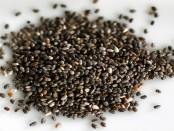Articles by Amy Campbell MS, RD, LDN, CDE
Most people don’t give mushrooms a second thought. They may have a few in their salads or on top of their burgers, but chances are, they don’t realize just how healthy mushrooms really are. Find out more about mushrooms, the benefits of adding them to your diet, and how to make them a part of your meal plan. [...]
Getting Through Menopause with Diabetes
Menopause is a normal part of every woman’s life. It can be hard to manage both menopause and type 2 diabetes, but it is possible. Here are a few things to keep in mind as you go through the process. [...]
Managing Gastroparesis with a Balanced Meal Plan
Gastroparesis is a common diabetes complication that affects the muscles in the stomach and intestines. Symptoms include fullness, bloating, heartburn, nausea, vomiting, diarrhea, and constipation. It can also be hard to keep your blood glucose under control if you have this condition. Some people with gastroparesis find it hard to eat any solid foods, which can lead to weight loss and malnutrition. [...]
Clean Eating: Should You Try It?
Are you curious about the “clean eating” trend? [...]
A Bigger Breakfast for Better Blood Glucose Control
Adelle Davis, an American author and nutritionist, once said: “Eat breakfast like a king, lunch like a prince, and dinner like a pauper.” While some recent research has shown that eating breakfast doesn’t necessarily help you lose weight, there’s plenty of other research that points to the importance of starting off the day with a healthy meal. [...]
The 2015 Dietary Guidelines and Diabetes
You might be familiar with the Dietary Guidelines for Americans, which are developed by nutrition experts and approved by the U.S. Department of Agriculture (USDA). The first edition of the Dietary Guidelines for Americans was issued back in 1980. Since then, a new version has been published every five years. It’s time for a new edition this year. What will be different? What will be new? And how might these guidelines affect people who have diabetes? [...]
Brush Up on Diabetes and Oral Health
Most of us know that we should brush and floss our teeth every day. But if you have diabetes, you may not realize just how important it is to keep your teeth and gums healthy. Diabetes can affect every system in your body, including the heart, nerves, kidneys, and eyes. Did you know that diabetes can affect your oral health, as well? Here are some tips to keep your mouth–and your diabetes control–in top shape. [...]
Body Mass Index and Heart Disease Risk: Is There A Connection?
There are several important numbers everyone should know — your address, phone number, social security number and date of birth. You should also know about numbers related to your body, such as height, weight and age. Do you know another important number that gives information about you? Are you familiar with your BMI? [...]
Aspartame: Safe at Last?
Could the popular sweetener aspartame be safe to eat after all? Aspartame, also known as Equal or NutraSweet, is a non-nutritive ,zero calorie sweetener Used in many sugar-free processed food and drink products. Over the years, aspartame has gotten bad press for claims that it causes health issues such asbrain tumors, memory loss, migraines, seizures, and depression, among other things. A recent review has found that several government agencies agree that aspartame does not pose any serious health risk and is safe to consume for all. [...]
Palm Oil and Palm Kernel Oil: Healthy or Not?
Coconut oil is all the rage lately, and many people have started to include it in their meal plans. However, coconut oil isn’t the only tropical oil in town. Palm oil and palm kernel oil are tropical oils as well, and while they may not be as popular as coconut oil, they’re quickly catching up. What are palm and palm kernel oils, and, most importantly, are they healthy to eat? [...]
Coconut Oil: Healthy or Not?
You don’t have to look too hard these days to find a mention of coconut oil on the Internet. And you can also find coconut oil in your local grocery store, where it’s practically been flying off the shelves. But is this fat really a “superfood,” as many claim, or do we need to step back and learn more about this tropical oil before we add heaps of it to our meal plans? [...]
Three Seeds to be Eating Now: Chia, Hemp and Flaxseed
Chances are, you don’t think a whole lot about eating seeds, unless they’re those sesame seeds on top of your morning bagel. Seeds and nuts are often lumped into the same category, in terms of nutrients. But up until now, it’s been the nuts that have gotten all the glory. Seeds may be small, but they can pack a nutrition punch. Most seeds, like nuts, contain healthy fats, protein, fiber and minerals. In addition, eating seeds has been linked with a lower risk of heart disease, lowered inflammation and even weight loss. Tell nuts to move over and make room for these three seeds. Read on to find out why you should make them a regular part of your eating plan. [...]
Wake Up to the Health Benefits of Oatmeal
Oatmeal may not seem like an exciting food. But if you learn how oatmeal can improve your health–and even make managing your diabetes a little easier–you may just change your mind. [...]
Live a Longer Life: Eat More Fiber!
Could fiber possibly be the Fountain of Youth? According to a new study that included data from almost one million people, those who ate the most fiber were 16 percent less likely to die than people who ate the least amount of fiber. The researchers also discovered that for every 10-gram increase in fiber intake, there was a 10 percent drop in any cause of death. [...]
Highlights of the 2015 Diabetes Medical Care Standards
Do you wonder where your diabetes goals came from? Have you thought about how your doctor and your healthcare team know what tests to do and when to do them? Do you know how the results of those tests help you manage your diabetes? These goals and tests don’t just happen. Every year, a dedicated group of diabetes clinicians and researchers convene to review, revise and develop what are called “Diabetes Medical Care Standards.” These guidelines are issued by the American Diabetes Association and are published each January in a supplement of the journal called Diabetes Care. These standards of care address everything from target A1C goals to foot care to managing diabetes during pregnancy to diabetes education. [...]
©1995-2015 OmniChannel Health Media. All rights reserved.
OmnichannelHealth Media, publisher of CDiabetes.com, does not provide medical advice, diagnosis or treatment. See additional information.















